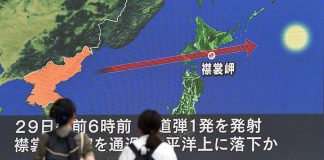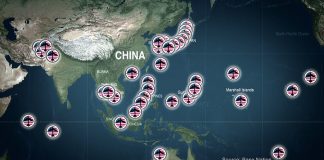Japan
On the Brink of Nuclear War
September 5, 2017
Special Report: As nuclear war looms in Korea, the life-or-death question is whether President Trump and his team can somehow marshal the...
America on the Brink of Nuclear War: Background to the North...
by William R. Polk
The US and North Korea are on the brink of hostilities that if begun would almost certainly lead to a nuclear...
US, N.Korea must stop playing with fire
By Kang Jie
On August 8, two US B-1B strategic bombers took off from Guam, flew over the eastern waters of North Korea and then...
China warns tensions on Korean Peninsula at ‘tipping point’
China has warned that the situation on the Korean Peninsula has reached “tipping point,” just hours after Pyongyang launched a ballistic missile. Meanwhile, North...
Encircling China and Using India against it
Doklam then and now: from British to Chinese interests, follow the money
A stalemate in the Himalayas, a three-way territorial struggle, fears of foreign hegemony...
Business as Usual: US Lies before Attacking
Pyongyang can miniaturize, so let’s move on to what’s important: David Wright on the North Korea crisis
By Lucien Crowder
On Tuesday, The Washington Post set...
The USA Seems Ready to Launch Nuclear War in Korea
North Korea stages large-scale artillery drill as U.S. submarine docks in South
North Korea conducted a big live-fire exercise on Tuesday to mark the foundation...
Trump-Calligula threatening Korea
Tense standoff continues on Korean peninsula
By Peter Symonds
The confrontation on the Korean Peninsula is continuing as the US threatens military action against North...
US Families evacuate South Korea, Japanese draw evacuation plans
Conflit imminent? Des militaires et des diplomates US évacuent leurs familles de Séoul
Des militaires américains ont commencé à évacuer leurs familles et le personnel...
Caligula’s Horse – Who is Running the United States of America?
As Trump warned North Korea, his 'armada' was headed toward Australia
When U.S. President Donald Trump boasted early last week that he had sent an...









